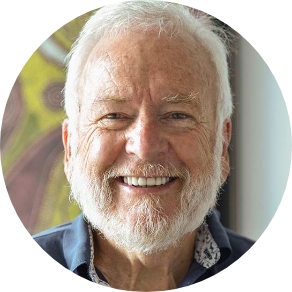This clinical trial will investigate the safety and preliminary effectiveness of the newly developed drug mEphA4-Fc in MND patients. After showing the potential for mEphA4-Fc to delay MND disease progression and improve communication between motor neurons in preclinical studies, researchers will now confirm if this drug is safe to use in people living with MND. The phase 1b trial aims to enrol 8 patients at the Royal Brisbane and Women’s hospital.
Prof Perry Bartlett says that the discovery that has had the most impact in his career “was the 1992 finding that the mature brain contains stem cells capable of producing new neurons.”
This opened a new horizon “where repair and recovery of function may be possible in humans.”
Prof Bartlett says that this was further clarified when stem cells were able to be isolated in 2011 and that “subsequent studies have [since] unravelled the role that the production of new neurons play in functions like learning and memory.”
Prof Bartlett and his colleague Emeritus Professor Andrew Boyd discovered that the ephrin receptor A4 (EphA4) was vital for motor neuron development in 1996. Subsequently they “demonstrated that blocking its action was important in repair of motor neurons following spinal cord injuries”
Blocking the EphA4 in MND
With this in mind, Professors Bartlett and Boyd surmised that EphA4 would have an impact on motor neurons in MND. Further studies, completed by themselves, and others, were able to demonstrate that blocking the EphA4 action would indeed be beneficial to the survival of motor neurons for those living with MND.
The molecule developed (which has been granted a patent in the USA) by Prof Bartlett and his team “is unique in that through competitive binding it can block the action of EphA4 for a prolonged period of time, making it suitable for weekly injection into MND patients.”
The Phase 1a trial, also supported by FightMND, is now nearing its final phase and the molecule has proven to be safe and well tolerated. The funds provided by FightMND will allow for extension of the trial for an additional six months, allowing the correct dosage to be determined and further safety and tolerability to be examined.
“We will use a variety of biomarkers and clinical observations to examine whether the treatment has provided some early signs of effectiveness,” said Prof Bartlett.
Data collated from the observations will allow for subsequent trials aimed at the therapeutic treatment of MND.
“Since our studies have shown that EphA4’s action is to damage motor neurons directly,
we would expect, like our animal studies, that blocking this action with EphA4-Fc would result in significant preservation of motor neurons, improve connectivity, and ameliorate the
disease process significantly,” he adds.
An award for service
Prof Bartlett was awarded an Officer of the Order of Australia in 2020, recognising his distinguished service to neuroscience research. He says the award not only recognises his laboratory’s work on understanding brain function, “but also, and more importantly, the service to the community’s well-being through the establishment and output of a world leading research Institute.”





